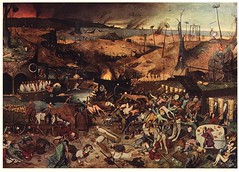I start where nightmares end.
Today I mistook Brueghel's "Triumph of Death" for something by Bosch ... I mean, they may have differing philosophies about life, death, and religion; but their painting styles feel very similar. Very "Where's Waldo" actually.
Seriously, though. Find the man wearing red pants, a blue shirt, and a white girdle thing.
You can do the same thing with any panel of Bosch's "Garden of Earthly Delights". In the center panel find the owl.
I think I'm predisposed to prefer Brueghel over Bosch, mostly because it was featured in the second part of Monty Python's "Spanish Inquisition" sketch.
The Harvard AMC is a good theatre so far as the non-stadium-seating variety go; however, the lack of indoor waiting room leaves something to be desired when there's a wind-chill in the 20s. I left my apartment at around 5 PM, and arrived at the Harvard T station at around 6 PM, surfacing at Church St. to find that the cinema had the line for the free preview of Pan's Labyrinth waiting along the outer wall of the building. Nicole was already in line, and only a few people from the front; so when they finally began to let the audience in, we basically had our choice of seats. And, really, had we been farther back in the line, I doubt it would've made a great difference. The theatre didn't fill up, and most of the right and left wings of the audience area were still empty by the time the lights began to dim.
Surprised? Not really. It never did strike me as something main-stream; it's in a foreign language, not an epic, nor does it have the kind of history and age to draw the kind of crowd that Lord of the Rings achieved. All that being said, it is a fairy tale for adults. El Laberinto del Fauno (Pan's Labyrinth) - In this fairy tale for adults, 10-year-old Ofelia (Ivana Baquero) stumbles on a decaying labyrinth guarded by Pan (Doug Jones), an ancient satyr who claims to know her destiny. With a new home, a new stepfather (Sergi Lopez) -- a Fascist officer in the pro-Franco army -- and a new sibling on the way, nothing is familiar to Ofelia in this Independent Spirit Award-nominated tale set in 1944 Spain from director Guillermo del Toro (Hellboy, Blade 2).
El Laberinto del Fauno (Pan's Labyrinth) - In this fairy tale for adults, 10-year-old Ofelia (Ivana Baquero) stumbles on a decaying labyrinth guarded by Pan (Doug Jones), an ancient satyr who claims to know her destiny. With a new home, a new stepfather (Sergi Lopez) -- a Fascist officer in the pro-Franco army -- and a new sibling on the way, nothing is familiar to Ofelia in this Independent Spirit Award-nominated tale set in 1944 Spain from director Guillermo del Toro (Hellboy, Blade 2).
Entering into it, and perhaps for the first half, one might think that the "adult" nature comes from the modern setting and vaguely period-based events that take place beside the fantasy; but even the fantastic elements possess an adult quality that I wouldn't recommend for children. Getting beyond the ambiguous Pan, there is the Pale Man (both acted by Doug Jones), a deformed monstrosity with cannibalistic tendencies. The story and rating allow for the gore of proper tales der Brüder Grimm (though, of course, this is entirely del Toro's product).
I do wish there had been more to tell about the step-father; there was a hint of dimension in the bare inclusion of his father's death as a topic in one conversation, but mostly we're left to a two-dimensional aspect of his character. He's cruel to Ofelia from the start; he doesn't especially care about his wife; and he only cares about his coming son insofar as the child represents a continuation of the Captain himself, a legacy of blood.
The point is, the man is a monster--as much as (or perhaps more-so than) the Pale Man. At least when Ofelia sees the Pale Man, she knows he's a dangerous creature. The Captain, however, takes the guise of humanity--and from Ofelia's point of view, there ought to be something more than a monster there. There really isn't. He's the Spanish equivalent of Hitler, and he seems to enjoy personally getting his hands dirty (versus the usual stink of association) with graphic acts of torture.
The ending, without giving anything away, is fittingly bitter-sweet. One is left wondering if what we see is real or a last fragmented imagining. Physical things accomplished and witnessed throughout the film, sometimes by more people than Ofelia (the root-baby screaming in the fire, the "doors" drawn in chalk when Ofelia is locked in her room), lead to the conclusion that it isn't all in her head. So maybe we're meant to think that there is something to the fairy tale.
11 January 2007
could be more sonic
Subscribe to:
Comments (Atom)


